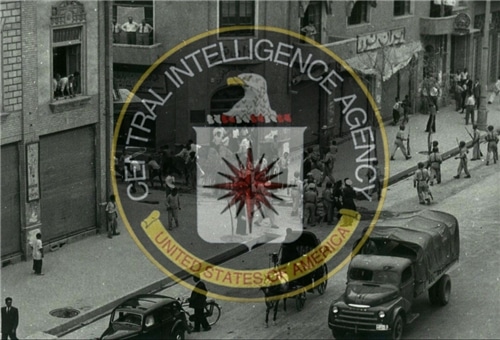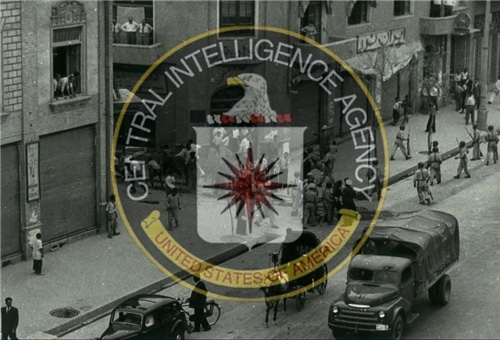As US officials continue to accuse Russia of meddling with the US presidential election, an accusation that they have provided no evidence whatsoever to support, let’s review some of the US government’s history of meddling with elections in others countries.
1. In 1951, the democratically elected parliament of Iran elected a man named Mohammad Mossadegh to be Iran’s prime minister. Mossadegh angered British Empire officials by nationalizing British oil interests in the country.
British officials then turned to the CIA for assistance. In 1953, the CIA secretly fomented a violent coup in Iran, which succeeded in ousting Mossadegh from power and making the Shah of Iran the supreme unelected dictator of the country.
To fortify the Shah’s dictatorial hold on power, the CIA helped organize and train the his domestic police force, the Savak, which was essentially a combination of the CIA, the NSA, and the military. Part of the CIA’s training involved teaching Savak agents the art of torture.
For the next 26 years, the Iranian people suffered under one of the most brutal and tyrannical dictatorships in the world, one that US officials fully supported and called an ally and friend of the United States.
In 1979, Iranians successfully revolted against the Shah’s regime and ousted him from power. One result was not a restoration of the democratic system that had elected Mossadegh but rather another brutal dictatorship, this time a religious one. Another result is the bad relations between the Iran and US governments that continues to exist today.
2. In 1951, the Guatemalan people democratically elected a man named Jacobo Arbenz to be their president. Arbenz, however, was not satisfactory to US officials, especially the national-security branch of the government, specifically the Pentagon and the CIA. The reason that US officials opposed Arbenz was that he was a socialist, and US officials considered a socialist president of Guatemala to be a threat to “national security” here in the United States.
In 1954 — one year after the coup in Iran, the CIA fomented a violent military coup that succeeded in removing Arbenz from power and replacing him with one of the most brutal unelected military dictators in Latin American history, a man named Carlos Castillo Armas. The CIA had a kill list prepared for the coup, which Arbenz was able to escape by fleeing the country before Castillo was able to get him. The CIA’s destruction of Guatemala’s democratic system threw the nation into a 30-year civil war that ended up killing millions of Guatemalan people, especially many of the poor.
3. In 1960 a man named Patrice Lamumba was elected Congo’s first prime minister after independence from Belgium. Lamumba spoke out against Western imperialism and refused to take sides in the Cold War, which caused the CIA to conclude that he was a threat to “national security.” The CIA orchestrated the assassination of Lamumba, which ended up taking place on January 17, 1961, just three days before President Kennedy, who liked Lamumba and who would have ordered the CIA to stand down, was to be sworn into office.
4. In 1970 a man named Salvador Allende received a plurality of votes in the presidential election in Chile. Pursuant to the Chilean constitution, the election was thrown into the national congress. President Richard Nixon, his national-security team, the Pentagon, and the CIA concluded that because Allende believed in communism and socialism, he posed a grave threat to “national security” here in the United States. The CIA attempted to bribe members of the congress to vote against Allende. It also orchestrated the kidnapping of the head of Chile’s armed forces, Gen Rene Schneider, who opposed a US military coup in his country, especially since a coup would violate the country’s constitution. The kidnapping attempt on Schneider left him dead.
The CIA then fomented a coup that took place on 9/11 1973 that violently ousted Allende from power and left him dead. Replacing him was army Gen. Augusto Pinochet, one of the most brutal unelected military dictators in history. By the time Pinochet’s 17-year reign of military terror came to an end in 1990, he and his CIA-supported goons had incarcerated, raped, tortured, or killed tens of thousands of innocent people — that is, people whose only “crime” was believing in socialism — with the full support of the CIA, Pentagon, Nixon, and his “national security” team.
Of course, there are also the more recent support of regime-change operations that ousted democratically elected presidents that the US government disapproved of, such as in Ukraine and Egypt.
And then there is the long list of countries where unelected dictators were targeted for regime change by the US national security state and, where successful, replaced with a brutal unelected pro-US dictator. Cuba, Indonesia, Iraq, Libya, and Syria all come to mind.
US officials need to keep in mind that when they point their accusatory index finger at Russia for supposedly meddling in the US presidential election, US officials have, at the same time, three fingers pointing back at themselves.
Reprinted with permission from the Future of Freedom Foundation.


